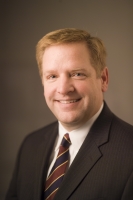BYU Professors Recommend Changes to Public Company Auditing Standards
PCAOB critique and suggestions published by the American Accounting Association

BYU accounting professor Steven GloverPROVO, Utah – Aug 27, 2009 – Seven years after the Public Company Accounting Oversight Board was created to protect investors against fraudulent accounting practices, two Brigham Young University accounting professors and a Case Western Reserve University Professor are calling for improvements in the current audit standard setting and inspection process.
Professors Steven Glover and Douglas Prawitt used their academic, professional and regulatory experience to address serious flaws within the PCAOB, a national board established by the Sarbanes-Oxley Act created to regulate the auditing profession in response to public accounting scandals like Enron and WorldCom.
"This is one of the roles university professors have," says Glover. "Our position in the accounting field allows us to objectively make suggestions and recommend where changes are needed."

BYU accounting professor Douglas Prawitt
By publishing the commentary, the authors hope to reduce complications and improve clarity in auditing standard setting and inspections.
Several different sets of standards both nationally and internationally cause complications for businesses, auditors, students and educators as they must learn about and comply with the different rules of each — an unnecessary toll according to the authors. They suggest the PCAOB work towards the convergence of existing standards instead of establishing a separate set. They also suggest an improved inspection process that is clear and concise, leverages the expertise of professionals and allows for a resolution process.
Although the commentary is hard hitting, the response from accountants, academia and the government has been overwhelmingly positive because it includes suggestions for improvement.
"It is a critique, but it goes far beyond that," says Prawitt. "It asks what can be done to rectify the situation. It's intended to be constructive."
They are already seeing support for change, even at the government level.
"Staffers at the Security and Exchange Commission and Government Accountability Office have expressed approving interest in the commentary" Glover says. "The GAO has publicly made similar observations and recommendations in their oversight of the PCAOB, as those in our article, and has asked permission to share the commentary with members of Congress."
Co-author Mark Taylor, a Case Western Reserve University accounting professor and a BYU MAcc graduate, says the commentary was written to generate discussion and lead to changes that could benefit all involved.
"Despite the good that has come from implementing Sarbanes-Oxley and establishing the PCAOB, we see opportunities for significant improvement to correct missteps and problems with the current inspection and standard setting approaches — that's the point of our commentary," says Taylor. "We know the PCAOB has the capability to work with the profession to bring about change."
The complete commentary is available in the most recent issue of Accounting Horizons, a quarterly journal of the American Accounting Association.
The Marriott School is located at Brigham Young University, the largest privately owned, church-sponsored university in the United States. The school has nationally recognized programs in accounting, business management, public management, information systems and entrepreneurship. The school's mission is to prepare men and women of faith, character and professional ability for positions of leadership throughout the world. Approximately 3,000 students are enrolled in the Marriott School's graduate and undergraduate programs.
Media Contact: Joseph Ogden (801) 422-8938
Writer: Christine Frandsen



